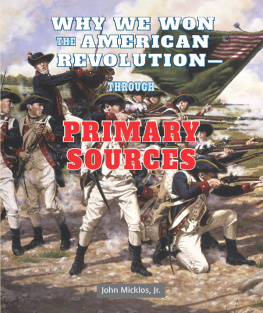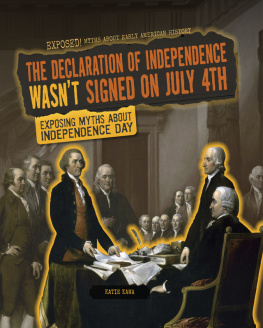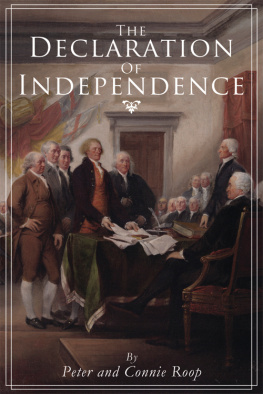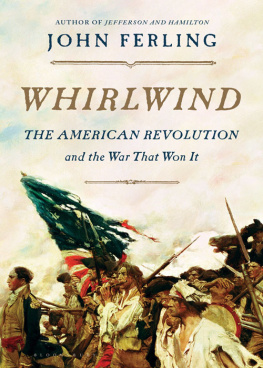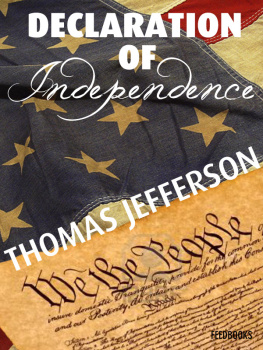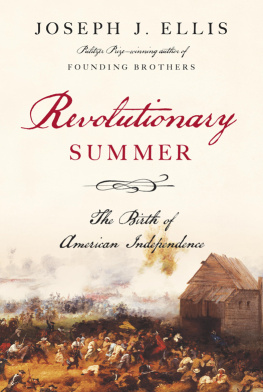The Ascent of George Washington: The Hidden Political Genius of an American Icon
Almost a Miracle: The American Victory in the War of Independence
A Leap in the Dark: The Struggle to Create the American Republic
Setting the World Ablaze: Washington, Adams, Jefferson, and the American Revolution
The First of Men: A Life of George Washington
Adams vs. Jefferson: The Tumultuous Election of 1800
John Adams: A Life
Struggle for a Continent: The Wars of Early America
A Wilderness of Miseries: War and Warriors in Early America
The Loyalist Mind: Joseph Galloway and the American Revolution
I N D E P E N D E N C E

THE STRUGGLE TO
SET AMERICA FREE
J O H N F E R L I N G

Copyright 2011 by John Ferling
All rights reserved. No part of this book may be used or reproduced in any manner whatsoever without written permission from the publisher except in the case of brief quotations embodied in critical articles or reviews. For information address Bloomsbury Press, 175 Fifth Avenue, New York, NY 10010.
Published by Bloomsbury Press, New York
LIBRARY OF CONGRESS CATALOGING-IN-PUBLICATION DATA
Ferling, John E.
Independence : the struggle to set America free / John Ferling. 1st U.S. ed.
p. cm.
Includes bibliographical references and index.
ISBN: 978-1-60819-008-9 (hardcover)
1. United StatesPolitics and governmentTo 1775. 2. United StatesHistoryColonial period, ca. 16001775. 3. United StatesPolitics and government17751783. 4. United StatesPolitics and governmentPhilosophy. 5. StatesmenUnited StatesHistory18th century. 6. Great BritainPolitics and government17601789. [1. United StatesHistoryRevolution, 17751783Causes.] I. Title.
E210.F45 2011
973.3dc22
2010049366
First published in the United States by Bloomsbury Press in 2011
This e-book edition published in 2011
E-book ISBN: 978-1-60819-380-6
www.bloomsburypress.com
To Dee Donnelly and Michelle Kuhlman
Who mean more to me than they will ever know
CONTENTS
1. :
The Proposal to Declare Independence
2. :
Lord North, Benjamin Franklin, and the American Crisis
3. :
Samuel Adams, Joseph Galloway, and the First Continental Congress
4. :
Lord Dartmouth, George Washington, Hostilities
5. :
John Dickinson and the Appeal of Reconciliation
6. :
John Adams and the Politics of a Divided Congress
7. :
George III and the American Rebellion
8. :
Charles James Fox, Thomas Paine, and the War
9. :
James Wilson, Robert Morris, Lord Howe, and the Search for Peace
10. :
Abigail Adams and the Realities of the Struggle for Independence
11. :
The Dilemma and Strategy of Robert Livingston
12. :
Thomas Jefferson and the Drafting of the Declaration of Independence
13. :
Setting America Free
14. :
America Is Set Free
Nearly all of us at times fall into the trap of looking back on historys pivotal events as inevitable. Were not the differences between the North and South destined to end in the American Civil War? Surely, Hitlers coming to power was unavoidable. Was not the collapse of the Soviet Union inescapable?
Well, perhaps not. Great events in history, and their outcomes, are seldom bound to happen. They hinge on happenstance, on complex twists and turns, and on choices made or unmade. Make one choice and history goes in one direction. Dont make that choice and events may well veer in another direction.
But once the end of the story is known, there is always a temptation to read history backward. Knowing how things turned out makes it easy to assume that the ending was foreordained.
That may be especially true for many Americans with regard to the declaring of independence in 1776. In recent years popular cultureand not a few writershas so lionized Americas Founding Fathers that many may see them as leaders whose indomitable will set them on an inexorable course toward independence.
History is more complicated. It seems certain that most Americans did not favor independence when what we now know as the War of Independence broke out in April 1775. Even after the war had raged for several months, many Americansagain, probably moststill did not want American independence. At the beginning of 1776 a majority of those who served in the Continental Congress preferred reconciliation with the mother country to American independence. Had the Continental Congress voted on independence in January or February 1776, no more than five of the thirteen colonies would likely have favored a final break with Great Britain.
This is a book about the evolution of the idea of American independence and about the events and decisions that ultimately led Congress, with the backing of most colonists, to set America free of the British Empire. The books subtitle contains the word struggle, and in fact those who favored severing all ties with Great Britain faced a long, difficult battle before, at last, they succeeded in declaring independence. Eleven years elapsed between Britains first attempt to tax the colonists and the Declaration of Independence. What we today call the War of Independence, or the Revolutionary War, had gone on for fifteen months before the Continental Congress declared independence. For more than a year the colonists fought, and died, not for American independence, but to be reunited with Great Britain on Americas terms.
A struggle over Great Britains policy toward the colonies was played out in London as well. Battles were fought in Parliament and within the ministry at every turn, from the passage of the first American tax in 1765 to the decision a decade later to use force rather than to engage in peace negotiations with the Americans. Powerful and articulate members of Parliament always opposed the American policies of their government, fearing that additional provocations would only push the colonists toward independence. Some proposed solutions to the Anglo-American crisis that, if adopted, might have stanched the drift to American independence.
This book is about the struggle in America over how best to resist British actions and secure American interests, and to secure the prevailing interest of individual colonies. It is also about the battles in London over how best to deal with, and respond to, the recalcitrant American colonists. It is a story filled with irony, for in the end the Americans opted for an independence that most of them had wished to avert, while Britains leaders were confronted with a declaration of American independence that they had sought to prevent, first by peaceful means, later through strident measures.
The choices that were made on both sides were made by individuals, and this book evaluates the key players, important members of the Continental Congress as well as British ministers and their principal adversaries in Parliament. Public officials in that day were not unlike todays officials. Some who held positions of authority were high-minded and sought what they thought was best for the nation. Some were visionaries. Some were inspired by deeply held philosophical convictions. Some were vengeful. Some acted on behalf of narrow provincial interests or sought to protect the entrenched elite. Some were motivated by the hope of enhancing their careers or reputations. Some sought economic gain. Many were driven by a combination of these motives. And no one had a crystal ball. No one could say unequivocally what the long-term results would be if the choice he advocated was adopted.
Next page

